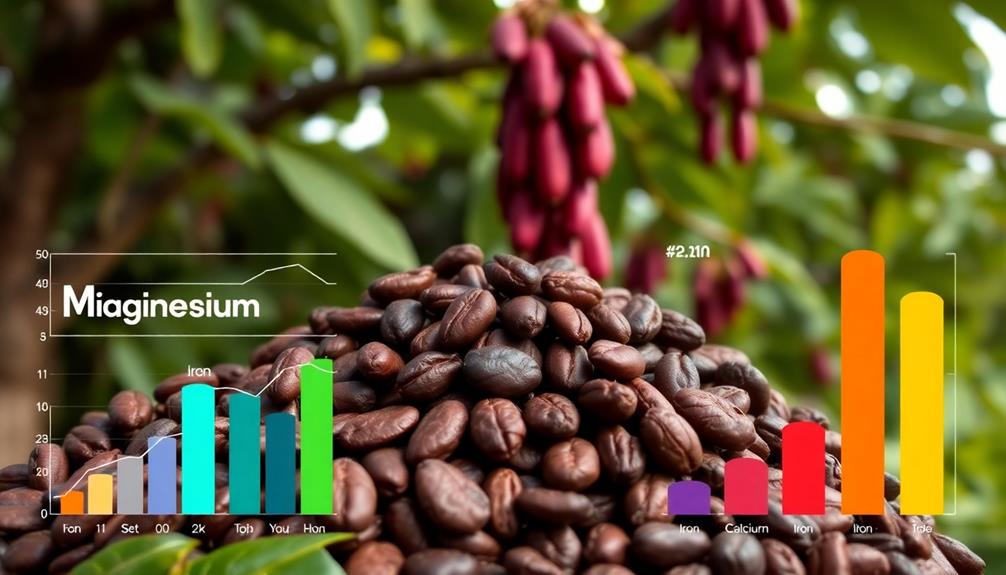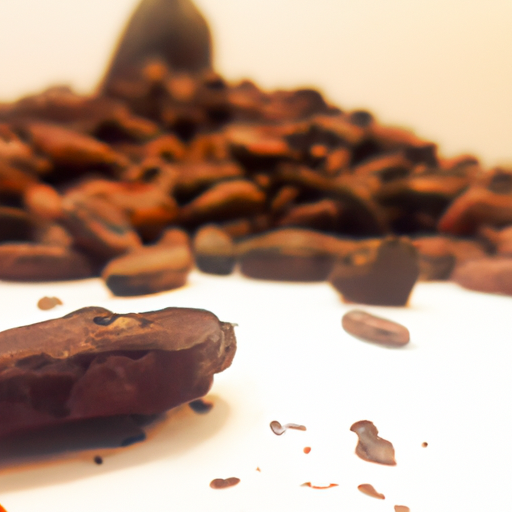Raw cacao is packed with essential minerals that boost your health. In just 100 grams, you'll find about 106 mg of calcium and 3.6 mg of iron, making it an excellent choice for bone strength and iron intake, especially for vegetarians. It's also rich in magnesium, contributing to muscle function and energy production. Plus, its phosphorus content supports cellular activities. Enjoying raw cacao can enhance your diet and deliver crucial nutrients, especially when you choose unprocessed forms like nibs or powder. Want to know how to maximize these benefits and integrate cacao into your meals?
Key Takeaways
- Raw cacao is a nutrient-dense superfood, rich in essential minerals like magnesium, calcium, iron, and phosphorus.
- A 100 g serving of raw cacao provides approximately 106 mg of calcium, 3.6 mg of iron, and over 200 mg of magnesium.
- The mineral content in raw cacao supports muscle function, heart health, and oxygen transport, especially beneficial for vegetarians and vegans.
- Processing methods can significantly diminish the mineral content, making raw cacao a more nutrient-dense option compared to processed cocoa.
- Regular consumption of raw cacao can enhance overall wellness and complement a balanced diet rich in other nutrient-dense foods.
Overview of Raw Cacao

Raw cacao, known for its rich flavor and health benefits, comes from the unprocessed seeds of Theobroma cacao. This minimal processing preserves a high concentration of essential minerals, making raw cacao powder a nutrient-dense superfood.
You'll find that its mineral content is impressive, with significant amounts of magnesium, calcium, iron, zinc, copper, potassium, and manganese. For instance, a 100 g serving of raw cacao provides approximately 106 mg of calcium and 3.6 mg of iron.
One of the remarkable aspects of raw cacao is its abundance of flavanols, which are linked to improved cardiovascular health and may enhance mineral absorption. This means that not only does raw cacao contribute crucial nutrients, but it also supports your body's ability to utilize them effectively.
Additionally, the high fiber content in raw cacao aids digestion, offering around 8.6 g of fiber per 100 g. This combination of minerals, flavanols, and fiber underscores why incorporating raw cacao into your diet can lead to multiple health benefits.
Key Minerals in Cacao
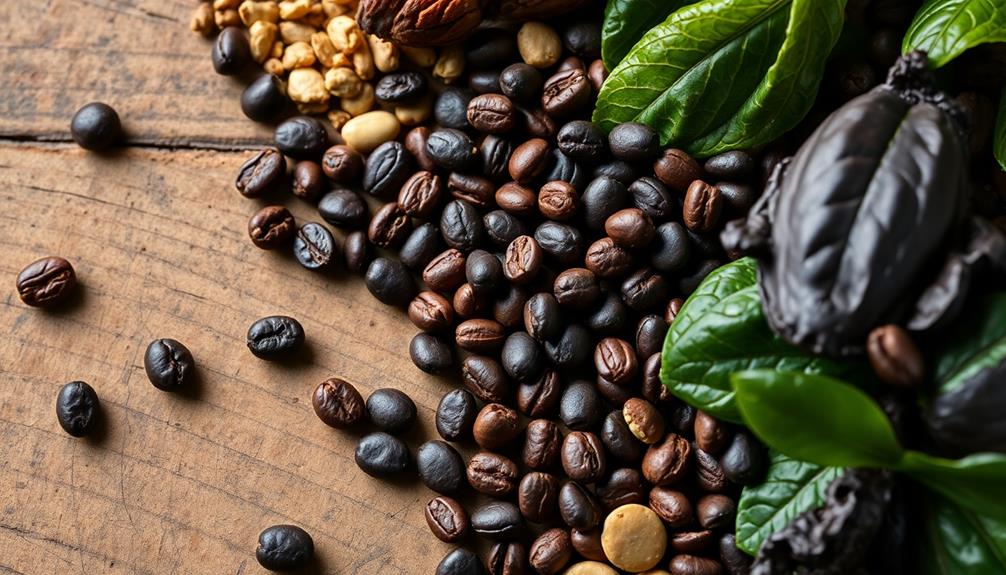
Cacao is a powerhouse of essential minerals that play an important role in maintaining your health. When you indulge in raw cacao, you're not just enjoying a delicious treat; you're also reaping the benefits of significant mineral content.
For instance, cacao is a fantastic source of iron, providing about 3.6 mg per 100 g. This makes it an excellent option for those dealing with iron deficiency, especially vegetarians and vegans.
Additionally, cacao boasts a remarkable phosphorus content, with around 537 mg per 100 g. Phosphorus is critical for energy production and helps in bone mineralization, ensuring your body functions effectively.
You'll also find a notable amount of magnesium—over 200 mg per 100 g—which is necessary for muscle and nerve function.
Don't overlook calcium either; cacao offers about 106 mg per 100 g, supporting bone health and various metabolic processes.
While these key minerals—iron, phosphorus, magnesium, and calcium—are abundant in cacao, it also contains trace minerals like zinc, copper, and potassium, all contributing to your overall well-being.
Health Benefits of Minerals
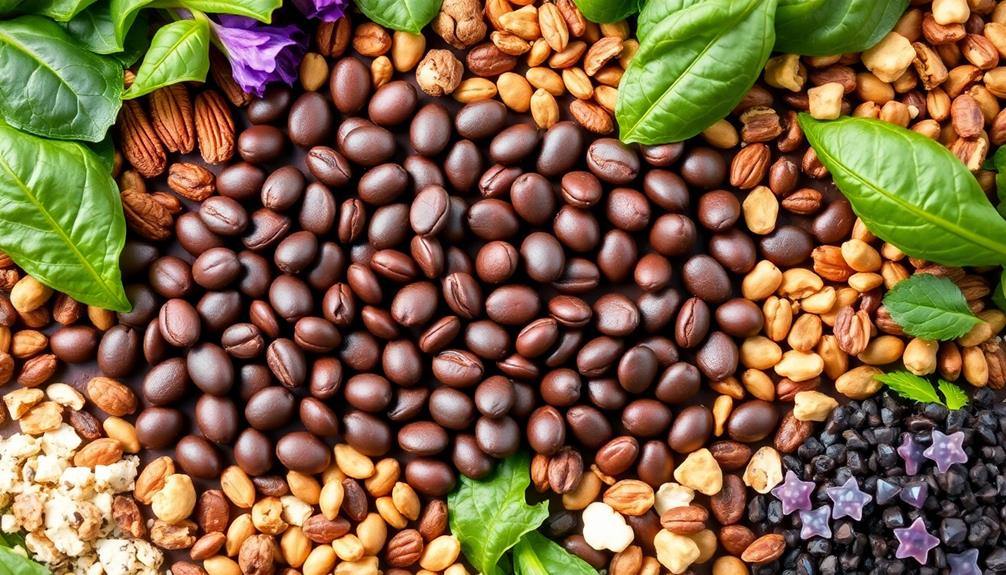
Minerals play an essential role in your overall health and well-being. They support key bodily functions, from muscle contraction to oxygen transport, ensuring you feel your best every day.
Additionally, certain minerals found in foods like raw cacao can also contribute to mental health, potentially enhancing cognitive function and mood stability through their impact on neurotransmitters teas serotonin boost.
Understanding the impact of these important nutrients can help you appreciate the benefits of incorporating raw cacao into your diet.
Essential Minerals Overview
A treasure trove of essential minerals awaits in raw cacao, making it a fantastic addition to your diet. This superfood is packed with significant amounts of magnesium, calcium, iron, and potassium, all important for your body's well-being.
Just a 100-gram serving of raw cacao can provide around 106 mg of calcium and 3.6 mg of iron, which can be beneficial if you're looking to boost your mineral intake. Regular consumption of raw cacao can also support a balanced diet, which is necessary for overall health and longevity, as emphasized in lifestyle for longevity.
Magnesium in raw cacao plays a key role in improving muscle function, energy production, and cardiovascular health. By incorporating cacao into your meals, you'll support your body's energy levels and overall heart health.
Additionally, the potassium content helps regulate blood pressure and guarantees proper nerve function, both significant for your overall bodily health.
Don't forget the importance of zinc, as well. Although not listed in your primary minerals, it's present in raw cacao and aids in immune function, wound healing, and protein synthesis.
Impact on Well-being
Incorporating raw cacao into your diet not only satisfies your cravings but also brings a wealth of health benefits linked to its rich mineral content. One of the standout minerals is magnesium, boasting about 272 mg per 100 g. This important nutrient supports muscle function, heart health, and even helps reduce anxiety, making it an excellent choice for stress relief.
Additionally, enjoying raw cacao can complement other healthful beverages, such as flower teas rich in antioxidants, enhancing your overall wellness regimen.
Iron is another essential mineral found in raw cacao, with approximately 3.6 mg per 100 g. This mineral is crucial for oxygen transport in your blood, making it particularly beneficial if you're a vegetarian or vegan struggling with iron deficiency.
Calcium, present at around 106 mg per 100 g, plays a significant role in maintaining strong bones and a healthy skeletal structure. It's important for anyone looking to support their bone health.
Lastly, potassium, found in raw cacao at about 715 mg per 100 g, aids in regulating blood pressure and promotes cardiovascular health by balancing sodium levels in your body.
Processing Effects on Nutrition
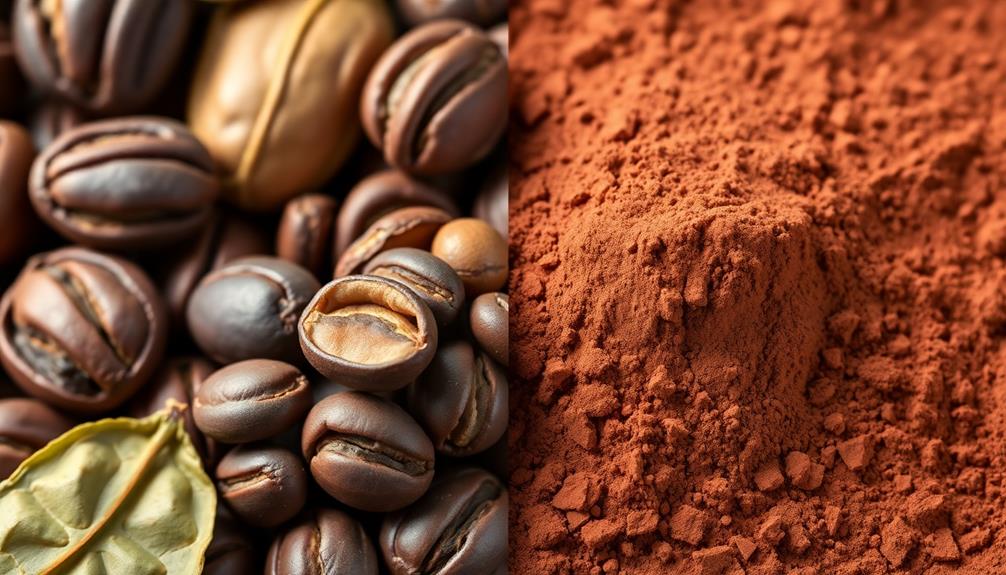
Processing methods greatly impact the nutritional value of cocoa beans, especially when it comes to their mineral content. Roasting, for instance, can increase iron levels, which is essential for your body's functions.
Cocoa beans are packed with essential minerals like magnesium, calcium, zinc, copper, potassium, and manganese, all of which play important roles in maintaining your health. However, how these beans are processed can alter their nutritional properties considerably.
Different processing methods can also affect the fat content of cocoa beans, which hovers around 43.78%. This percentage can vary depending on the specific variety and the processing techniques employed.
Additionally, gamma irradiation has been found to change the fatty acid composition in cocoa beans, potentially influencing both mineral retention and the bioactive compounds that contribute to their health benefits.
You'll also notice that variations in nutritional properties exist across different cocoa bean varieties, influenced by the specific conditions under which they're processed.
Understanding these effects can help you make more informed choices about the cacao products you consume and their overall nutritional value.
Comparing Cacao and Cocoa
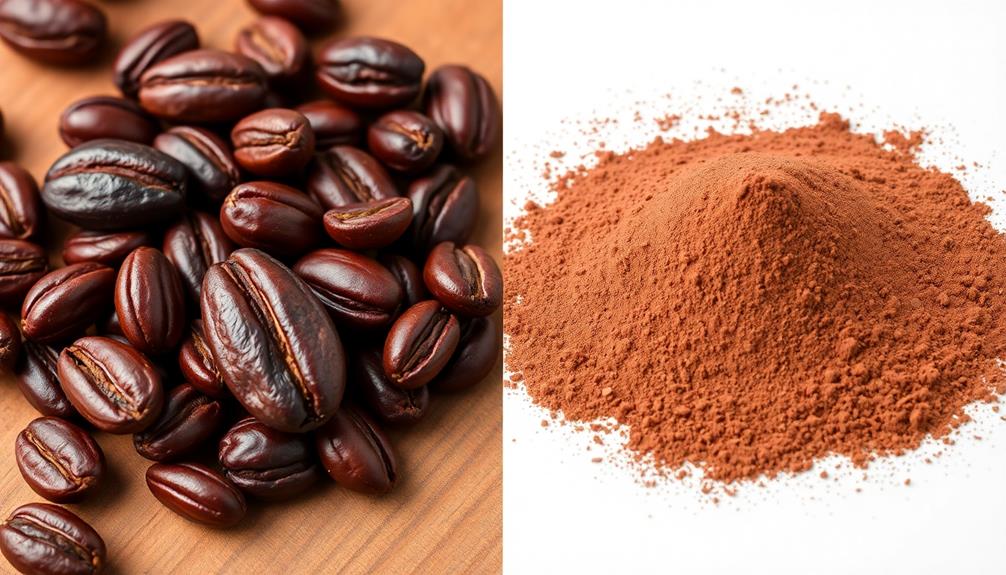
Cacao and cocoa are often confused, but they represent different stages of the same plant's journey from bean to product. Cacao refers to the raw, unprocessed seeds from the Theobroma cacao tree, while cocoa is the processed version, typically undergoing high-temperature drying. This processing can greatly reduce the nutritional value of cocoa.
When you look at their nutritional profiles, cacao shines with its higher antioxidant content. Raw cacao boasts about 95,500 ORAC units compared to only 26,000 ORAC in roasted cocoa. This means you'll get more health benefits from cacao, thanks to its rich flavonoid content.
Additionally, cacao is packed with essential minerals like magnesium, iron, and potassium, which may be diminished in cocoa due to processing methods.
Although both cacao and cocoa have similar fat content, the caloric density can differ because cocoa products often contain added sugars.
To conclude, if you're seeking a more nutrient-dense option with better antioxidants and minerals, raw cacao is the clear winner over cocoa. So, next time you're choosing between them, remember the notable differences in their nutritional value.
Best Practices for Consumption
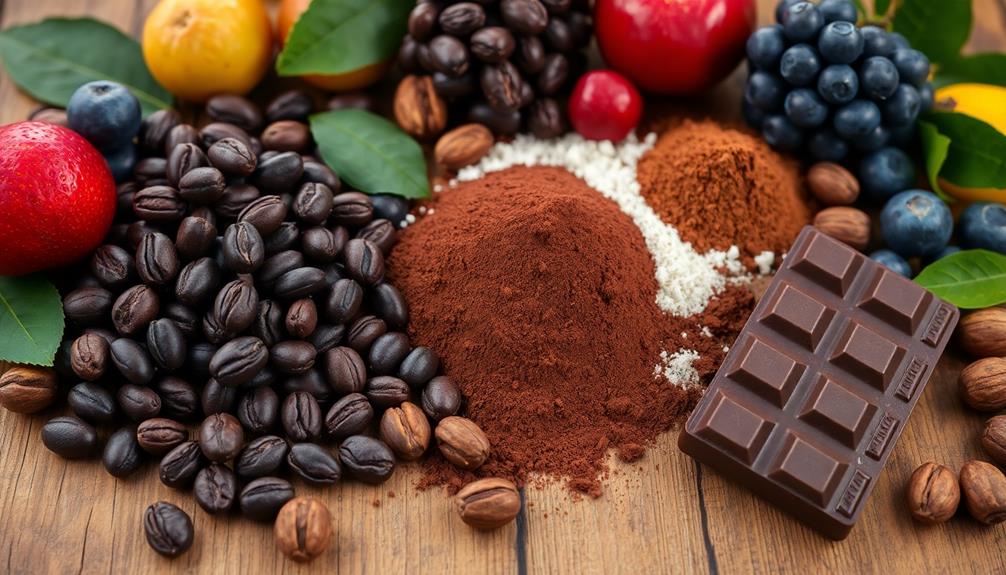
When it comes to enjoying raw cacao, you'll want to contemplate the best practices for consumption.
Stick to the recommended serving size of about 20 grams, and pair it with non-dairy alternatives to maximize antioxidant absorption.
Also, think about incorporating it into raw recipes to preserve its nutrients and health benefits.
Optimal Pairing Suggestions
To enhance your experience with raw cacao, consider pairing it with complementary foods that elevate both flavor and nutritional value. These combinations not only amplify the rich taste of raw cacao but also boost its antioxidant and nutrient profile. Here are some ideal pairing suggestions:
| Food Pairing | Benefits | Flavor Profile |
|---|---|---|
| Nuts (Almonds/Walnuts) | Provide healthy fats and protein | Earthy and crunchy |
| Bananas/Berries | Offer vitamins, antioxidants, and sweetness | Creamy and fruity |
| Smoothies | Enhance antioxidant content | Rich and satisfying |
| Yogurt (or Alternatives) | Increases calcium and probiotics | Creamy and tangy |
| Natural Sweeteners (Honey/Maple Syrup) | Healthier dessert alternative | Sweet and indulgent |
Recommended Serving Sizes
Pairing raw cacao with complementary foods is just the beginning of enhancing your experience; understanding the right serving sizes is equally important for maximizing its health benefits. The recommended serving sizes for raw cacao generally fall between 1 to 2 tablespoons (about 10 to 20 grams).
Here are some best practices to keep in mind:
- Daily Intake: Aim for around 20 grams of dark chocolate every three days to enjoy ideal health benefits, thanks to its high cocoa content.
- Baking Tips: When using raw cacao powder in recipes, limit the baking temperature to preserve its nutritional properties, as excessive heat can diminish antioxidants.
- Snacking Smart: Incorporate raw cacao nibs in your trail mixes or smoothies, ensuring you keep portion sizes manageable to avoid excessive caloric intake.
Nutrient Preservation Techniques
How can you confirm that you're getting the most out of raw cacao's impressive nutrient profile? Start by choosing cacao beans that undergo minimal processing. This guarantees you retain higher levels of antioxidants and essential minerals. Consume raw cacao in its natural form, like cacao nibs or powder, to benefit from magnesium, iron, and potassium without the losses from roasting.
To further enhance nutrient preservation, avoid heating raw cacao above 40°C. High temperatures can degrade its beneficial compounds. Instead, incorporate cacao into no-bake recipes or sprinkle it on smoothies and oatmeal. Pairing raw cacao with non-dairy alternatives can also boost antioxidant absorption, as dairy may inhibit the bioavailability of crucial nutrients.
Here's a quick reference table for best practices:
| Technique | Benefit |
|---|---|
| Minimize Processing | Higher antioxidants and minerals |
| Avoid Heating Above 40°C | Preserve delicate nutrients |
| Use Non-Dairy Alternatives | Enhance nutrient absorption |
Cacao in a Balanced Diet
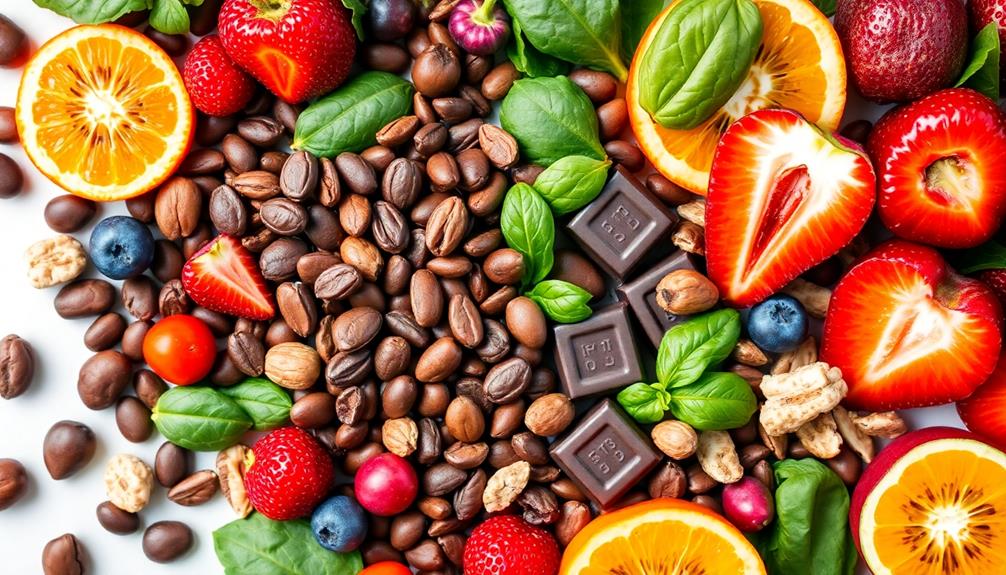
Incorporating cacao into your balanced diet can be a delicious way to boost your mineral intake. Raw cacao is packed with essential minerals that support various bodily functions. Here are three key benefits of adding raw cacao to your diet:
- Calcium Boost: With about 106 mg of calcium per 100 grams, cacao can help strengthen your bones and teeth.
- Iron Source: It contains approximately 3.6 mg of iron, making it an excellent option, especially for vegetarians and vegans needing extra iron.
- Energy Production: The high phosphorus content, around 537 mg per 100 grams, supports energy production and overall health.
When consumed in moderation, raw cacao enhances your diet without overwhelming your calorie intake, offering about 140 calories per 100 grams.
It's best to choose less processed forms, like raw cacao powder or nibs, to fully benefit from its rich mineral content.
By adding cacao to smoothies, oatmeal, or baked goods, you can enjoy its rich flavor while nourishing your body with essential minerals.
Frequently Asked Questions
What Is the Nutritional Value of Raw Cacao?
Raw cacao's nutritional value is impressive; it's packed with essential minerals, antioxidants, and fiber. You'll benefit from its rich nutrient profile, supporting digestion and overall health, while indulging in a delicious treat.
Does Cacao Deplete Magnesium?
You wouldn't want to rob Peter to pay Paul, right? Cacao itself doesn't deplete magnesium, but overindulging without balancing your diet can lead to nutrient imbalances, so enjoy it wisely alongside other magnesium-rich foods!
How Much Magnesium Is in Raw Cacao?
You'll find raw cacao contains about 540 mg of magnesium per 100 grams. Incorporating it into your diet can help you meet your daily magnesium needs while also enjoying its rich, delicious flavor.
Does Raw Cacao Have High Oxalates?
Yes, raw cacao does have moderate oxalate levels, around 2-3% of its dry weight. If you're prone to kidney stones, it's best to limit your intake and stay well-hydrated for better health.
Conclusion
Incorporating raw cacao into your diet is like adding a sprinkle of magic to your health journey. Packed with essential minerals, it not only satisfies your sweet tooth but also boosts your well-being. Remember to choose high-quality cacao and enjoy it in moderation to reap the full benefits. By embracing this rich superfood, you'll create a delicious balance that nourishes both body and soul while indulging in nature's chocolatey treasure.

